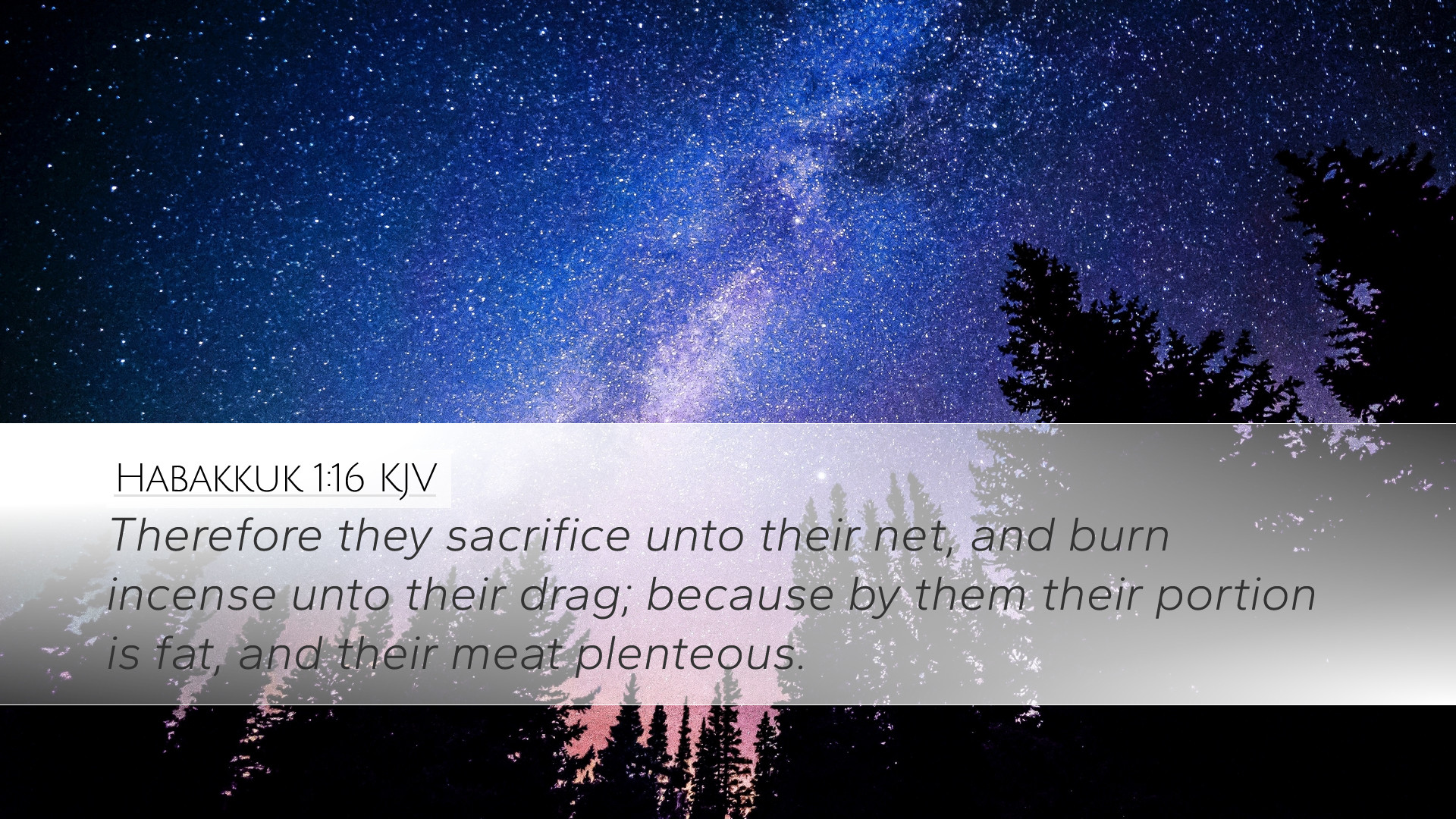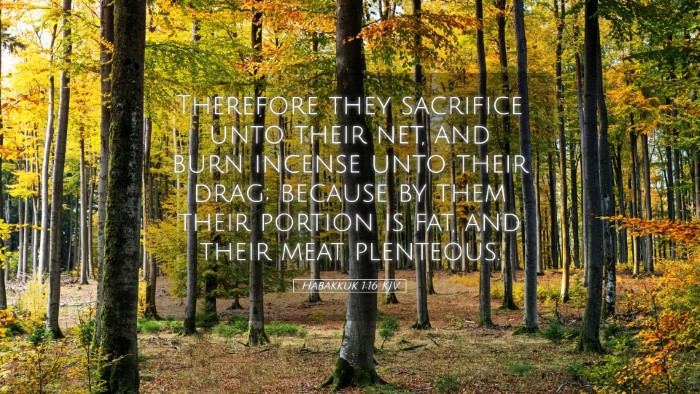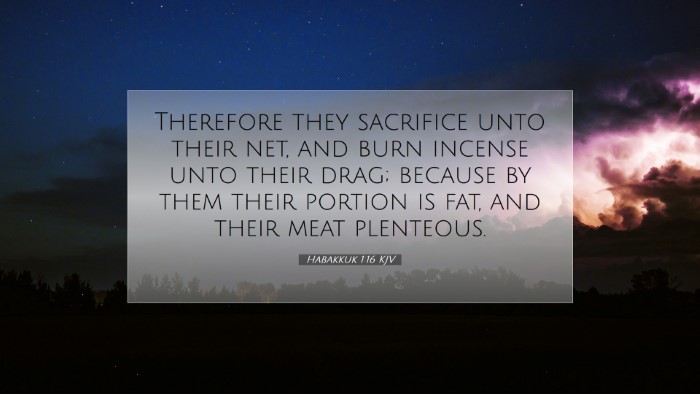Old Testament
Genesis Exodus Leviticus Numbers Deuteronomy Joshua Judges Ruth 1 Samuel 2 Samuel 1 Kings 2 Kings 1 Chronicles 2 Chronicles Ezra Nehemiah Esther Job Psalms Proverbs Ecclesiastes Song of Solomon Isaiah Jeremiah Lamentations Ezekiel Daniel Hosea Joel Amos Obadiah Jonah Micah Nahum Habakkuk Zephaniah Haggai Zechariah MalachiHabakkuk 1:16
Habakkuk 1:16 KJV
Therefore they sacrifice unto their net, and burn incense unto their drag; because by them their portion is fat, and their meat plenteous.
Habakkuk 1:16 Bible Commentary
Commentary on Habakkuk 1:16
Verse Context: Habakkuk 1:16 states, "Therefore they sacrifice unto their net, and burn incense unto their drag; because by them their portion is fat, and their meat plenteous." In this verse, the prophet Habakkuk critiques the idolatry and materialism observed among the Chaldeans (Babylonians), who prioritize their wealth and success over worshiping the true God.
Introduction
This commentary seeks to explore the implications of Habakkuk 1:16, drawing insights from established Biblical scholars such as Matthew Henry, Albert Barnes, and Adam Clarke. The verse provides a profound reflection on human tendencies towards idolatry and dependence on material wealth.
Theological Themes
The verse encapsulates several important theological themes that warrant deeper exploration:
- Idolatry: The act of sacrificing to the net represents a perversion of worship; it highlights how people can elevate their creations or possessions to the status of deities.
- Materialism: Emphasis on physical abundance ('their portion is fat') reflects the human inclination to find security and identity in material wealth.
- Divine Judgment: Implicit in the verse is the notion that such sinfulness and idolatry attract divine judgment, setting the stage for the righteous indignation of God portrayed throughout the book of Habakkuk.
Commentary Insights
Matthew Henry’s Perspective
Matthew Henry illustrates the grave error of the Chaldeans in their idol worship, emphasizing that their sacrifices are not made to the Creator, but rather to their own achievements. He draws attention to the futility of such practices, suggesting that reliance on their own strength—symbolized by the 'net'—leads to spiritual blindness. Henry points out that the worship of our resources leads to a cyclic dependence on that which cannot save, critiquing the notion of self-sufficiency.
Albert Barnes’ Analysis
Albert Barnes offers a more contextual view, placing this verse within the broader landscape of the Babylonian culture, known for its militaristic and economic prowess. He elaborates that the 'net' symbolizes the means by which they capture wealth and power. Barnes emphasizes the stark reality that such physical successes result in a false sense of security, reinforcing the idea that reliance on material goods is ultimately precarious and leads to spiritual emptiness. In his analysis, he warns the faithful of the dangers of consuming passions driving the unholy worship of prosperity.
Adam Clarke’s Commentary
Adam Clarke expands on the cultural implications present in this verse, highlighting the sacrificial system of the Babylonians. He points out that the act of burning incense signifies an act of devotion and acknowledgment of their dependency on their idols for sustenance and prosperity. Clarke argues that this behavior reveals a tragic misunderstanding of God’s sovereignty and provision, illustrating how misplaced priorities can lead communities away from the true worship of God. He passionately calls for a return to the recognition of God as the ultimate source of all blessings, urging believers to examine their own hearts for similar tendencies.
Applications and Implications
As we reflect on the profound message of Habakkuk 1:16, it is crucial for pastors, students, theologians, and scholars to consider its implications in contemporary life:
- Self-Examination: Individuals and congregations should regularly assess what they truly worship. Are we sacrificing our time, resources, and energy to our careers, possessions, or status rather than to God?
- Stewardship: The call to responsible stewardship is vital. Believers are called to view their resources as gifts from God, meant to be utilized for His glory rather than mere self-interest.
- Social Justice: Habakkuk addresses the dangers of wealth accumulation at the expense of others. In our modernization, how do we ensure that our prosperity does not come from exploitation or marginalization?
- Worship Understanding: Understanding what constitutes true worship is essential—a heart aligned with God versus a heart enamored by earthly gains.
Conclusion
Habakkuk 1:16 serves as a timeless reminder of the human propensity toward idolatry and materialism. The insights gleaned from commentaries by Matthew Henry, Albert Barnes, and Adam Clarke echo through the ages, urging us to reject dependence on anything other than God. In a world rife with distractions and competing priorities, let this verse inspire us to focus our hearts on the one who provides for all our needs, encouraging a robust and faithful worship that honors the divine over the temporal.


